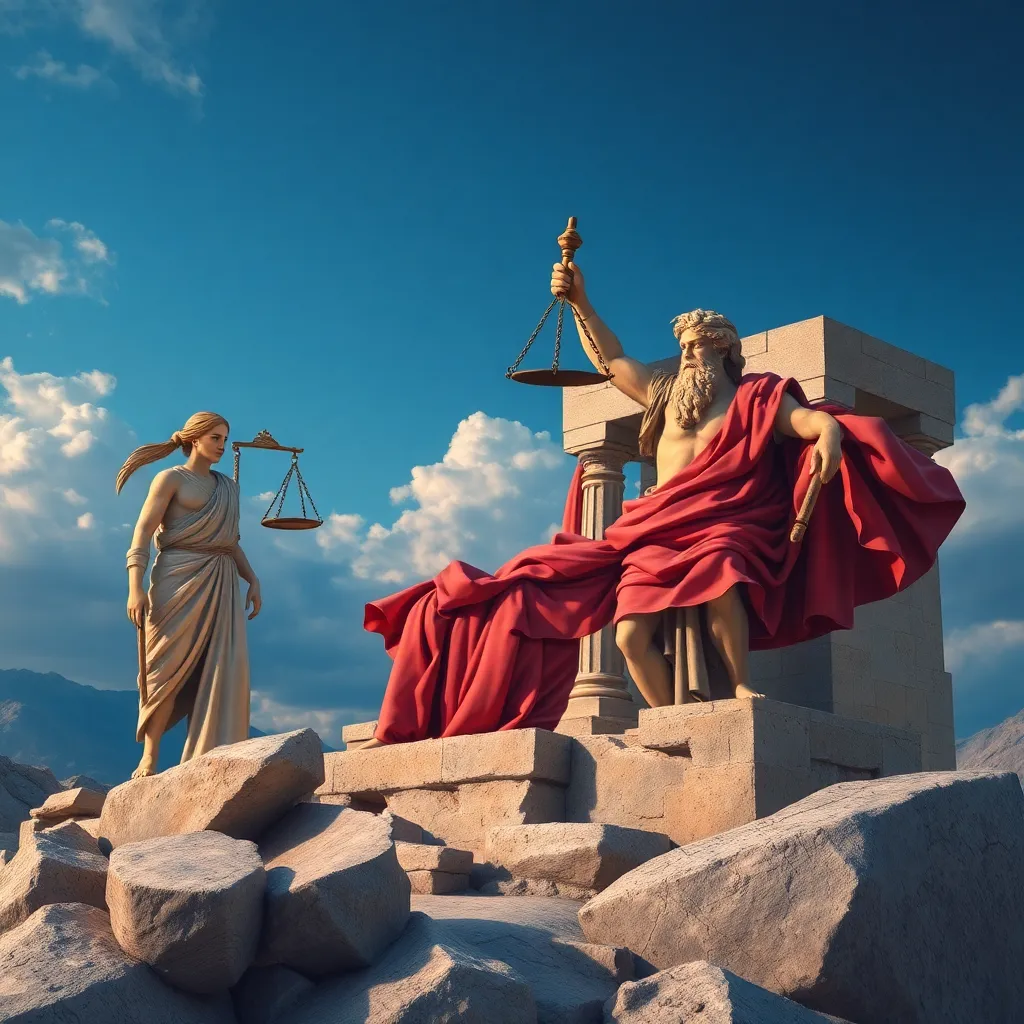Odysseus and the Concept of Justice: The Resolution of Conflicts
I. Introduction
Odysseus, the legendary hero of Homer’s epic poem “The Odyssey,” stands as a central figure in Greek mythology, embodying a complex interplay of intellect, bravery, and moral ambiguity. His journey home from the Trojan War is not just a tale of adventure but also a profound exploration of justice and its implications. Justice, in the context of Odysseus’s narrative, serves as a guiding principle that influences his decisions and interactions with others.
This article aims to delve into how Odysseus navigates the concept of justice throughout his epic journey, reflecting on the various conflicts he faces and the resolutions he employs.
II. The Nature of Justice in Ancient Greece
Justice in ancient Greek society was deeply intertwined with moral and ethical considerations, reflecting the values and beliefs of the time. The Greeks viewed justice as a fundamental virtue, essential for maintaining order within both human society and the cosmos.
- Historical context: Justice was often linked to the idea of arete, or excellence, which encompassed moral integrity and the pursuit of virtue.
- Moral frameworks: Decisions were guided by a combination of societal norms, personal ethics, and the teachings of philosophers such as Plato and Aristotle.
- Role of the gods: The gods played a significant role in determining justice, often intervening in human affairs to ensure that moral order was upheld.
III. Odysseus as a Just Leader
Odysseus exemplifies the traits of a just leader throughout his journey, characterized by fairness, wisdom, and a deep sense of responsibility.
- Traits of justice: Odysseus is known for his cleverness and strategic thinking, but he also demonstrates empathy and a commitment to his crew’s welfare.
- Key decisions: His decision to spare the lives of the minstrel Phemios and the herald Medon after the slaughter of the suitors illustrates his capacity for mercy.
- Comparisons with other leaders: Unlike Agamemnon, who often resorts to authoritarian measures, Odysseus shows a more nuanced approach to leadership that balances authority with compassion.
IV. Conflicts Faced by Odysseus
Throughout “The Odyssey,” Odysseus encounters numerous conflicts that test his character and beliefs about justice.
- Major conflicts: His struggles include confrontations with mythical creatures, hostile gods, and treacherous humans, all of which challenge his sense of justice.
- External vs. internal conflicts: While he faces external threats, Odysseus also grapples with internal dilemmas, such as his desires for revenge and the longing for home.
- Fate and free will: The interplay between fate, as dictated by the gods, and Odysseus’s exercise of free will complicates his journey toward justice.
V. The Resolution of Conflicts: Strategies Employed by Odysseus
Odysseus’s approach to resolving conflicts is marked by a combination of cunning, negotiation, and, at times, retribution.
- Cunning and intellect: His cleverness is exemplified in his encounter with the Cyclops Polyphemus, where he devises a plan to escape by tricking the giant.
- Negotiation and compromise: Odysseus often seeks peaceful resolutions, as seen in his interactions with Circe, where he negotiates for the safe passage of his crew.
- Vengeance and retribution: However, Odysseus also demonstrates a capacity for vengeance, particularly in his treatment of the suitors, where justice blurs into revenge.
VI. The Role of Divine Intervention in Justice
The gods play a crucial role in shaping Odysseus’s journey and the concept of justice throughout “The Odyssey.”
- Influence of gods: Athena, the goddess of wisdom, acts as a protector and guide for Odysseus, often intervening to assist him in his quest.
- Divine justice vs. human agency: While Odysseus exercises his free will, the gods’ interventions highlight the tension between divine justice and human actions.
- Omens and prophecies: The presence of omens and prophecies significantly impacts Odysseus’s decisions, suggesting that the path to justice is often guided by forces beyond human control.
VII. The Legacy of Odysseus and Justice
Odysseus’s journey has left an indelible mark on the understanding of justice in literature and culture.
- Shaping perceptions: His actions and decisions have influenced countless stories, contributing to the archetype of the just leader who navigates moral complexities.
- Enduring relevance: The themes of conflict resolution and justice resonate through the ages, offering insights into modern discussions of ethics and leadership.
- Lessons learned: Odysseus’s journey serves as a reminder of the complexities of justice, emphasizing the importance of empathy, wisdom, and moral courage.
VIII. Conclusion
In conclusion, Odysseus’s narrative in “The Odyssey” intricately weaves the concept of justice through his trials and triumphs. His character embodies the complexities of human experience, where the lines between justice, vengeance, and mercy often blur.
Reflecting on Odysseus’s journey provides valuable insights into the nature of justice, suggesting that it is not merely a rigid principle but a dynamic interplay of personal choices and societal values. The implications of his story continue to inspire contemporary discussions on justice and conflict resolution, reminding us that the quest for justice is a timeless and universal challenge.




